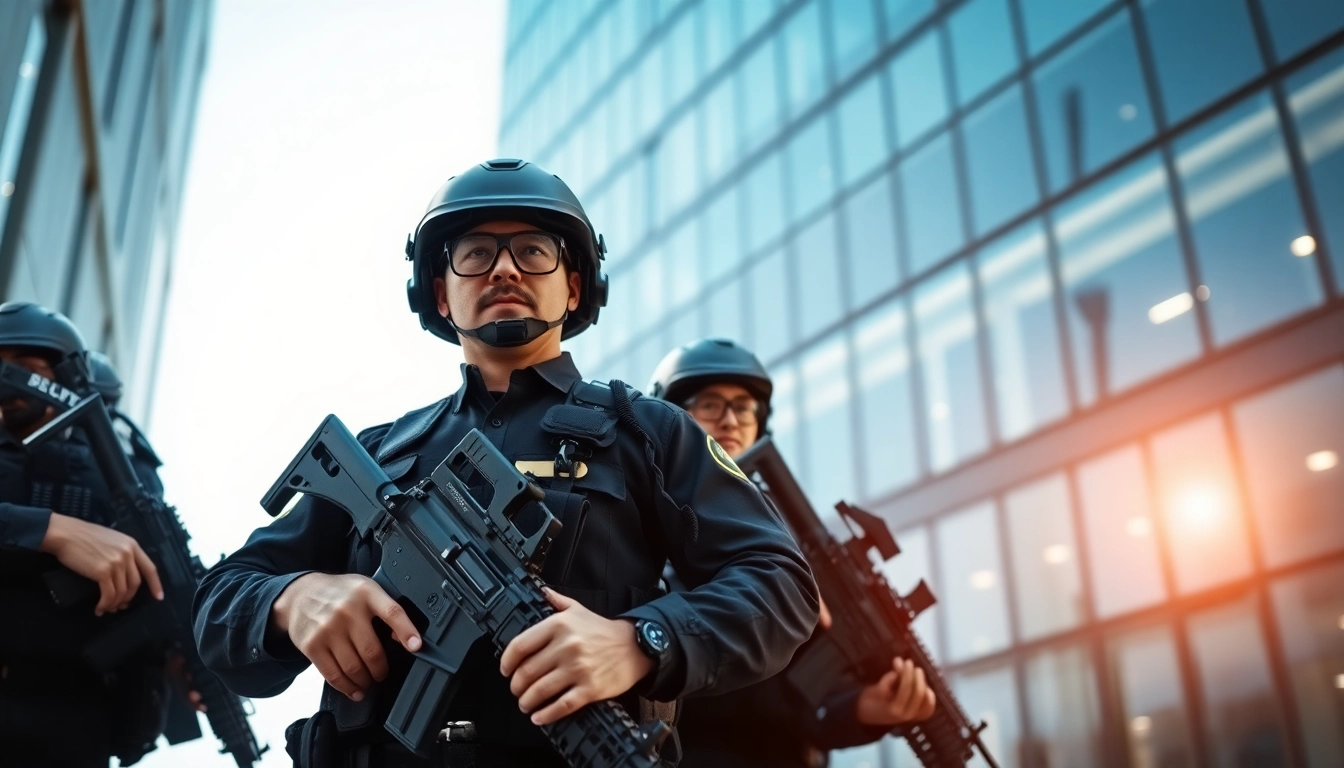Understanding the Importance of Armed Security Guards
In today’s world, the presence of armed security guards has become increasingly vital for safeguarding property, assets, and lives. These professionals are often hired to provide heightened security in various environments, including corporate offices, educational institutions, and public venues. The importance of armed security guards cannot be overstated, as they play a crucial role in deterring crime and responding effectively during emergencies. Through rigorous training and comprehensive knowledge of security protocols, they ensure a reliable and trustworthy security presence.
What Are Armed Security Guards?
Armed security guards are trained professionals who are legally authorized to carry firearms while on duty. Their responsibilities extend beyond merely having a visible weapon; they must also be knowledgeable about how to handle firearms safely and effectively in various situations. Armed guards undergo extensive training, which includes understanding the legal implications of using force, conflict resolution, and emergency response tactics. This multifaceted approach equips them to manage potentially dangerous situations while prioritizing the safety of others.
Reasons for Hiring Armed Security Guards
Organizations consider hiring armed security guards for several reasons, primarily focused on enhanced safety and protection. Here are some reasons why hiring an armed guard might be advantageous:
- Deterrence: The presence of armed security significantly deters criminal activity. Potential offenders are less likely to target areas where they know armed guards are on duty.
- Emergency Response: Armed security guards are trained to handle crises effectively. In a situation where immediate action is required, their ability to respond quickly can be the difference between safety and disaster.
- Protection for High-Value Assets: Businesses that deal with high-value goods or sensitive information often require armed guards to ensure these assets are protected from theft or vandalism.
- Support for Events: Large gatherings, public events, or private celebrations often benefit from armed security to manage crowds and provide a sense of safety to attendees.
Differences Between Armed and Unarmed Security Guards
While both armed and unarmed security guards serve the fundamental purpose of safeguarding property and individuals, key differences set them apart:
- Authority and Equipment: Armed security guards carry firearms and have the legal authority to use them in defense situations, which creates a different level of authority and control compared to unarmed guards.
- Training and Certification: Armed guards must complete additional training and certification, including firearms handling, legal protocols associated with weapon use, and more extensive emergency response scenarios.
- Response to Threats: Armed guards are trained to confront threats with varying levels of force, while unarmed guards typically employ de-escalation techniques and conflict resolution strategies without the use of weapons.
Qualifications and Training Required for Armed Security Guards
The qualifications and training of armed security guards are critical in ensuring they perform their duties effectively and responsibly. Below are key aspects of these requirements.
State Regulations and Licensing Requirements
The requirements to become an armed security guard can vary significantly from state to state. Most states mandate that armed security personnel must have a valid license to carry a firearm. This generally involves meeting age, educational, and citizenship requirements, as well as completing a specified amount of training hours. Additionally, potential guards may need to pass background checks to ensure they do not have a criminal history that would disqualify them from carrying a weapon.
Essential Skills for Armed Security Guards
In addition to mandatory training and licensing, armed security guards should cultivate a specific set of skills:
- Situational Awareness: The ability to assess a situation effectively and recognize potential threats or conflicts is essential.
- Communication Skills: Armed guards must articulate clearly both verbally and in writing, whether interacting with the public, reporting incidents, or collaborating with law enforcement.
- Physical Fitness: Maintaining a level of physical fitness is crucial, as armed security personnel may need to respond quickly in emergencies.
- Conflict Resolution: Skills in de-escalating situations without force are important to minimize harm and restore peace effectively.
Training Programs and Certification
Various training programs exist to prepare armed security guards for their roles. These often include both classroom instruction and hands-on training. Certification may cover topics such as:
- Firearms safety and handling
- Legal standards regarding the use of force
- Emergency response protocols
- First aid and CPR training
Completion of these programs is a requirement for obtaining an armed security license and ensures guards are adequately prepared to protect themselves and those they are responsible for.
Roles and Responsibilities of Armed Security Guards
The roles and responsibilities of armed security guards encompass a variety of tasks aimed at ensuring safety and security. An understanding of their duties helps organizations better utilize these professionals.
Duties During Routine Patrols
During routine patrols, armed security guards are responsible for monitoring designated areas to prevent crime, ensure safety, and observe for unusual activities. Common duties include:
- Conducting regular inspections of the premises, including checking exits and entrances.
- Monitoring surveillance equipment to detect suspicious behavior or traffic.
- Documentation of incidents, observations, and any irregularities in patrol reports.
- Engaging with staff and visitors to foster a welcoming environment while providing security presence.
Emergency Response Protocols
In the event of an emergency, armed security guards are expected to act decisively. Their protocols often include:
- Identifying potential threats and assessing the situation swiftly.
- Executing evacuation plans and ensuring the safety of individuals within the area.
- Coordinating with local law enforcement and emergency services effectively and efficiently.
- Utilizing de-escalation techniques when possible to minimize further harm.
Collaboration with Law Enforcement
Armed security guards often work alongside local law enforcement agencies. Their collaboration can enhance security measures and typically involves:
- Sharing intelligence about potential threats or ongoing criminal activities.
- Participating in joint training exercises to strengthen emergency response efforts.
- Establishing clear communication protocols to ensure seamless coordination during incidents or emergencies.
Choosing the Right Armed Security Guards for Your Needs
When considering hiring armed security guards, organizations should take several factors into account to ensure they select the right professionals for their specific security needs.
Assessing Security Requirements
The first step is to evaluate security requirements by identifying potential risks and threats unique to the organization. This can include assessing the environment, existing security measures, and previous incidents to better understand where armed security can provide the most value. Organizations should also consider the types of events taking place, as different situations may require distinct security approaches.
Evaluating Security Agencies
When selecting a security agency, thorough evaluation is essential. Key aspects to consider include:
- Experience and reputation of the agency within the industry.
- Depth of training provided to armed security guards, including certifications and licenses.
- Flexibility in service offerings to match specific security needs.
- References or testimonials from past clients that speak to the agency’s effectiveness and reliability.
Factors to Consider in the Selection Process
Several additional factors can also influence the selection process:
- Cost: While cost should not be the sole deciding factor, it is critical to ensure that the budget aligns with the necessary security arrangements.
- Compatibility: Establishing a good working relationship with security personnel is essential. This includes shared values and communication styles.
- Availability: Depending on the security needs, it may be essential to ensure that armed guards can be available on short notice or at specific times.
Future Trends in Armed Security Services
The field of armed security is continually evolving, adjusting to new threats, technologies, and changing needs in society. Awareness of future trends can provide insights for organizations looking to enhance their security measures effectively.
Technological Advances in Security
Technology is playing an increasingly vital role in the effectiveness of armed security services. Innovations such as:
- Advanced surveillance systems that can detect unusual activity or provide real-time monitoring.
- Data analytics that offer insights into potential security risks based on historical patterns.
- Mobile applications that allow for instant communication between security personnel, management, and emergency services.
Such advancements are transforming how armed security operates, making operations more efficient and responsive to incidents.
Shifts in Hiring Patterns Post-Pandemic
The global pandemic has significantly shifted hiring patterns within the security industry. Organizations are now prioritizing:
- Hiring armed security guards who are adept at managing public health protocols, including crowd control and health screenings.
- Implementing flexible staffing models to adapt quickly to changing security needs, including temporary or event-based contracts.
- Fostering an adaptable security approach that considers a variety of potential threats, including health crises.
Enhanced Training Techniques for Armed Security Guards
As security challenges evolve, so too must training. Emerging techniques that are gaining traction in the industry include:
- Scenario-based training that closely mimics potential real-world threats.
- Incorporating virtual reality or simulation technologies for more immersive training experiences.
- Regular refresher courses to keep guards updated on the latest procedures, laws, and tactical skills.
These advanced training methods ensure armed security guards are prepared to handle new threats effectively.



